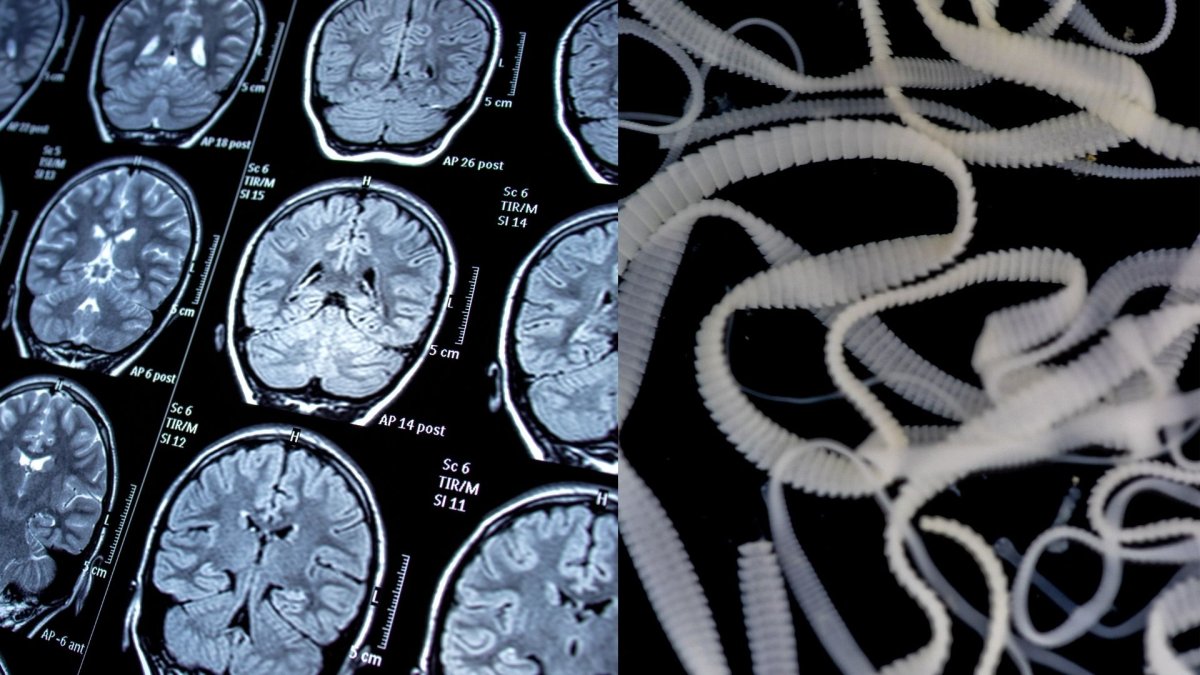Doctors have discovered that a 38-year-old man who was left "speaking gibberish" after a violent seizure had a parasitic tapeworm infection in his brain.
The man, who has not been identified, arrived at Massachusetts General Hospital in Boston after a 4 a.m. seizure left him shaking on his bedroom floor. His case has been documented in The New England Journal of Medicine.
Initially, doctors were puzzled as to what was causing the condition. When the 38-year-old, who was in good health and had no history of seizures, suffered another episode, doctors ordered MRI and CT scans of his brain, which revealed three lesions.
These legions led to the realization that larval cysts from a tapeworm had traveled to the man's brain, in a condition called neurocysticercosis.
Neurocysticercosis is the most serious form of cysticercosis, which occurs when pork tapeworm infects parts of the body, and can be fatal when left untreated, according to the Centers for Disease Control and Prevention (CDC). Neurocysticercosis occurs when that infection is in the brain or spinal column.
What are the symptoms of neurocysticercosis?
The symptoms of neurocysticercosis depend on the location of the infection and how many cysts there are in that region.
The CDC says that the most common symptoms of the condition are seizures and headaches. Other symptoms can include confusion, lack of attention to people and surroundings, and difficulty balancing.
Neurocysticercosis can also lead to a condition called hydrocephalus, which is characterized by excess fluid around the brain. Neurocysticercosis is also a leading cause of adult-onset epilepsy worldwide, according to the CDC.
How do you get a tapeworm infection in the brain?
Like other types of cysticercosis, nuerocysticercosis occurs when a person swallows microscopic eggs passed in the feces of a person who has an intestinal pork tapeworm.
The CDC says this usually occurs when a person who has eaten undercooked pork passes the eggs and then prepares food, or touches food preparation surfaces, without washing their hands.
These eggs are then swallowed when contaminated food is eaten. Once inside the body, the eggs hatch, developing into larvae which, in cases of neurocysticercosis, travel to the brain.
After this has happened, the person infected with the tapeworm larvae may not demonstrate symptoms for months or even years. This usually occurs when the cysts die and trigger the swelling of brain tissues, or other bodily tissues. The CDC says that it is this swelling causing pressure that leads to the onset of symptoms.
In the case of the 38-year-old man diagnosed with the condition, doctors who treated him believe that he was initially infected 20 twenty years before he developed symptoms.
The authors of the study wrote: "On the basis of the features of the patient's presentation, the fact that he had been healthy the day before the seizure, and his history of living in a rural area of Guatemala, neurocysticercosis is the most likely diagnosis in this case."
While cases of neurocysticercosis are more common in rural areas of developing countries, the CDC says that there are an estimated 1,000 new hospitalizations for neurocysticercosis in the U.S. each year. Cases are more common in New York, California, Texas, Oregon, and Illinois.
Neurocysticercosis has been revealed as the cause of several medical mysteries over recent years. This includes the case of a Texas man who was discovered to be suffering from the condition after having splitting headaches, drowsiness, and fainting.
How is tapeworm in the brain treated and prevented?
Neurocysticercosis can be treated with anti-parasitic drugs in combination with anti-inflammatory drugs, but surgery may be required in extreme cases to remove the cysts. In other cases, medications may be used to treat seizures rather than addressing the parasite directly.
The CDC says that the easiest way to prevent neurocysticercosis and related conditions is to practice good food hygiene, ensuring that hands are washed after visiting the restroom or changing diapers. Additionally, raw vegetables should be washed and peeled.
It also advises that travelers to developing countries should only drink bottled or boiled water. If these are not available water can be filtered and iodine tablets dissolved in the filtered liquid.

Uncommon Knowledge
Newsweek is committed to challenging conventional wisdom and finding connections in the search for common ground.
Newsweek is committed to challenging conventional wisdom and finding connections in the search for common ground.
About the writer
To read how Newsweek uses AI as a newsroom tool, Click here.








